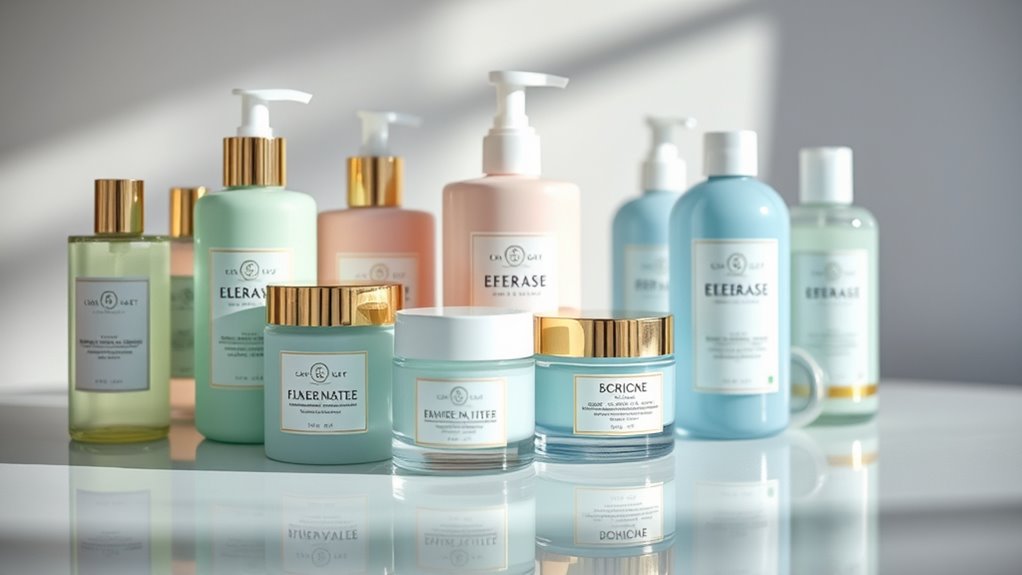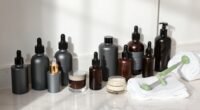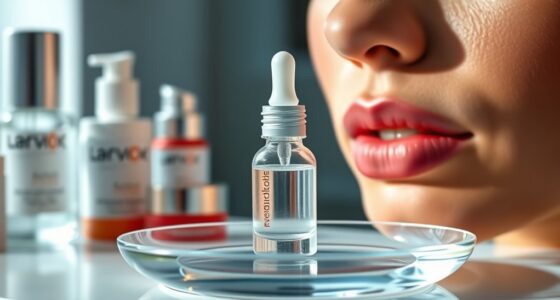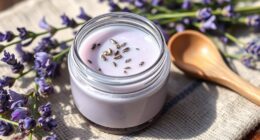Choosing the right cleanser depends on your skin type—oily, dry, sensitive, or combination. For oily skin, opt for foaming formulas with salicylic acid to control oil. Dry or sensitive skin benefits from creamy, hydrating cleansers with ingredients like glycerin. Avoid harsh sulfates, alcohol, and fragrances that can cause irritation or dryness. Using the correct technique, like gentle circular motions and lukewarm water, helps you get the best results. Keep exploring to discover how to perfect your cleansing routine.
Key Takeaways
- Identify your skin type (oily, dry, sensitive, or combination) to choose the most suitable cleanser.
- Select gentle formulas free from harsh sulfates, alcohol, fragrances, and artificial dyes to prevent irritation.
- Use proper cleansing techniques: start with damp skin, gentle circular motions, and lukewarm water for thorough cleaning.
- Consider double cleansing—using an oil-based cleanser first, then a water-based one—for deeper impurity removal.
- Match cleanser ingredients to skin needs: foaming for oily skin; hydrating, soothing formulas for dry or sensitive skin.

Have you ever wondered how to choose the perfect cleanser for your skin? It’s a common question because not all cleansers are created equal, and picking the right one can make a big difference in your skincare routine. The first step is understanding your skin type—whether it’s oily, dry, sensitive, or combination. Once you know that, you can better select a product tailored to your needs. But even then, it’s essential to be aware of the ingredients to avoid. Some ingredients can strip your skin of its natural oils, cause irritation, or worsen existing skin issues. For example, harsh sulfates like sodium lauryl sulfate can be overly drying, especially for sensitive or dry skin. Alcohol-based cleansers might feel invigorating initially but can dry out your skin over time. Fragrances and artificial dyes are also common irritants, so if you have sensitive skin, these are best avoided.
Cleansing techniques play a vital role in how effective your cleanser is and how your skin responds. You should always start with damp skin—this helps to loosen dirt and excess oil without causing friction that can irritate your skin. Use gentle, circular motions to massage the cleanser into your skin; avoid scrubbing aggressively, which can damage your skin barrier. Rinsing thoroughly with lukewarm water is ideal, as hot water can strip away natural oils and cold water might not effectively remove residues. Pat your face dry gently with a soft towel instead of rubbing, to prevent irritation. If you wear makeup or sunscreen, consider double cleansing: start with an oil-based cleanser to dissolve makeup and SPF, then follow up with a water-based cleanser to remove any remaining impurities.
Choosing the right cleanser also involves understanding ingredients that suit your skin’s needs. For oily skin, look for foaming cleansers with salicylic acid or benzoyl peroxide, which help control oil and prevent breakouts. Dry or sensitive skin benefits from creamy or hydrating cleansers containing glycerin or hyaluronic acid, which moisturize without stripping. If your skin is prone to redness or irritation, opt for fragrance-free, soothing formulas with ingredients like aloe or chamomile. Remember, the goal isn’t just to clean but to do so without disrupting your skin’s natural balance.
Frequently Asked Questions
Can I Use the Same Cleanser for Morning and Night?
You can use the same cleanser morning and night if it suits your skin, but consider dual cleansing if you wear makeup or sunscreen. Opt for fragrance-free options to reduce irritation and choose gentle formulas for both times. If your skin feels tight or dry after using the same cleanser twice, switch to different ones tailored for morning and evening to better meet your skin’s needs.
Are Natural Ingredients Always Better for My Skin?
You might think natural ingredients are always better, but that’s not always true. Sometimes, they can cause allergies or irritation if your skin is sensitive. Natural ingredients can be safe, but ingredient safety depends on your skin type and how your skin reacts. It’s smart to pay attention to how your skin responds, rather than just assuming natural means safer. Always check for potential sensitivities and choose products suited to your skin’s needs.
How Often Should I Change My Cleanser?
You should change your cleanser when your skin’s pH balance shifts or if you notice ingredient sensitivity or irritation. Typically, every few months is ideal, as formulas can lose effectiveness or cause reactions over time. Pay attention to how your skin responds; if it becomes dry, oily, or irritated, switching cleansers can help restore balance and prevent issues related to ingredient sensitivity or pH imbalance.
Can Using the Wrong Cleanser Worsen My Skin?
Using the wrong cleanser is like putting the wrong key in a lock; it can worsen your skin. If it disrupts your pH balance or contains ingredients you’re sensitive to, you might experience dryness, irritation, or breakouts. Choosing a cleanser suited for your skin type helps maintain your skin’s health. Always read labels carefully and opt for gentle, pH-balanced formulas to avoid aggravating your skin.
Is It Necessary to Use a Toner After Cleansing?
You don’t have to use a toner after cleansing, but it can be beneficial. Toner benefits include balancing your skin’s pH, removing leftover dirt, and prepping your skin for moisturizer. The frequency of toning depends on your skin type—most people can use it daily or as needed. If your skin feels fresh and clean after cleansing, skipping toner is fine, but if you want extra care, it’s a good step.
Conclusion
Now that you’ve navigated the world of cleansers, think of your skin like a garden in need of gentle tending. Choosing the right cleanser is like selecting the perfect water—nurturing without overwhelming. When you match your skin’s needs with a thoughtful choice, you’re cultivating a radiant, healthy glow that blooms naturally. Remember, your skincare routine is your personal symphony—each step harmonizing to reveal your most luminous self.









